However which way you analyze all the economic indicators, and whatever your opinion may be regarding Britain’s relationship with the European Union (EU), removing the movement of EU labour into the UK will create a perilous shortage of labour, particularly for low-to-mid skilled professions. If anything, removing the worker base at the lower end of the skills spectrum is worse than at the high-end for the simple reason it’s much harder to entice people into jobs that may be low-paid, unattractive, and – in many cases – require hard graft for low wages. How are our hotels and restaurants going to find 120,000 staff willing to work for the minimum wage, our food factories to renew a third of their workforces to prepare our food, and our cleaning firms going to backfill 132,000 people willing to mop and scrub for a living? The answer is sadly obvious – many of our industries will be under real threat of implosion because they simply cannot access the people they need to keep them functioning.
And without a thriving working class, the economy will suffer due to less money being spent; our businesses will suffer because of rising hotel costs; our entire society will suffer because of rising food costs; and our commercial and domestic real estate markets will struggle to complete projects. While professions like education and hi-tech can source talent from elsewhere (and are less reliant on EU people imports), it’s those industries that form the underbelly of the economy which will really suffer. Forget “trickle down economics” Brexit will cause a “trickle up” effect that will be hazardous for the British economy and its mid-long term sustainability. In the short-term, many EU workers in the UK should be able to stay on, but the reliable conveyor belt of workers prepared to roll their sleeves up and support our entire economic underbelly will be permanently halted, and the availability of workers will get progressively worse – and much more expensive with this shrinking supply of people.
So, without further ado, let’s dive into the fuller implications of this seemingly masochistic self-flagellation known as “Brexit”…
Nice try, Theresa, but even your dancing can’t make us forget about the increasingly no-win Brexit scenario
For our fellow Britons, these past few weeks have been a refreshing break from the normal Brexit debates as we became distracted instead by our premier literally dancing for trade agreements. Trade agreements that, even for the most dismally poor mathematicians, don’t stack up when compared to the one we’ll soon be leaving.
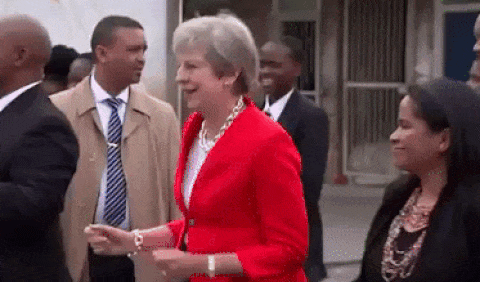
Brexit has been a topic of heated debate for years now – and I’m sure we all have that friend or relative you daren’t mention Brexit in front of or risk a lecture based on unfounded inferences and sketchy sources. In many ways, it’s these long-winded and often inebriated debates that are the problem – we’re close to the day we sever ties with Europe and reclaim some sort of democratic freedom that only a nation with several unelected heads of state can find any ironic sense in. And yet we’re no closer to understanding what Brexit means – even if we had a clear picture of how awful it will be at least that’s something we can prepare for. Instead of this mind-numbingly irritating narrative from British politicians of ‘Don’t worry, it’ll all work out in the end.’ Well, unfortunately, we’re not an eight-year-old child looking for reassurance from our grandmother that the mean kids at school will be our friends eventually. We need proper answers. Or we’re screwed. Even more screwed than if we voted to, say, leave one of the biggest trade deals in the world.
The lack of decisiveness and the longer this goes on, the more of a no-win scenario this becomes. The fact of the matter is that regardless of your pollical leaning the longer this is drawn out, the less likely we are to see any benefits or have adequate protection from the risks – with neither side of the debate getting what they want. Much like Starfleet academy trainees in the Kobayashi Maru simulation (or a classic Catch-22 for the more cultural amongst us,) Ms. May is in a no-win situation and, as time presses on, will be far less likely to pull off a Captain Kirk-like miracle. Let’s break down the Hobson’s choice of our leadership face.
Britain is the destination for 32% of Europe’s Science, Technology, Engineering and Mathematics (STEM) graduates – but for how long?
Imagine this, you’re a business executive desperate to bring in some decent talent to help make your business successful and competitive. You offer a decent salary, good job prospects and you’re in a great location. But then your boss’s boss puts a cap on the number of talented people you can bring in, and as a cherry on top, talks loudly about creating a ‘hostile atmosphere’ for talented people. As if by magic, the applications to work for your team just dry up.
Now let’s zoom out to the national picture and that’s basically what happened. The National Health Service (NHS) is reporting one of the biggest staffing crisis in its history, and businesses all over the country are struggling to get the right people in to help them move forward.
The key point is that Britain has grown as a technology titan not through the efforts of its native population alone. It’s access to an enormous pool of talented professionals and bright academics that help drive national economic growth. A report from the European Commission (we even rely on Europe for decent data) highlights a shortfall in domestic British STEM graduates based on the demands of the labour market which, coupled with the insight that the destination of 32% of EU foreign STEM students makes us wonder what the future holds.
We’re not economic experts but we get IT and Digital – in both of these areas there continues to be a giant war for talent. And that was before we went all Brexity and Hostile. Now, why should the bright young developers and consultants from across the globe come to the UK to work? It was part of a giant labour market which made it attractive to the ambitious and talented, but may not be as attractive after brexit. Honestly, almost everyone we’re speaking to now can see this car crash a mile off. Business leaders are looking to move operations to EU nations to soften the blow, and even UK professionals are pouring over their family tree to find a potential route to European citizenship (That’s if Farage and his fellow Brexiteers don’t beat them to it…it’s so annoying when these foreigners put caps on citizenship…).
The pound devaluation versus high labour demand paradox
But it’s not all bad news – the crash of ol’ reliable British Sterling could make the UK a cheap enough nearshore location that some enterprises could be convinced to stay or even broaden their operations. At least in the short-term. You see, a weak pound is one thing, but if the talent crisis gets any worse, paradoxically, the cost of labour will increase. As businesses battle for talent, one of the only weapons in their arsenal is to up salaries – while real-term wage increases may not be on the cards across the board, for good digital talent, it could send salaries rocketing, negating any benefit of currency exchange. So, even when Brexit delivers the goods…on closer inspection, they’re not the goods we want.
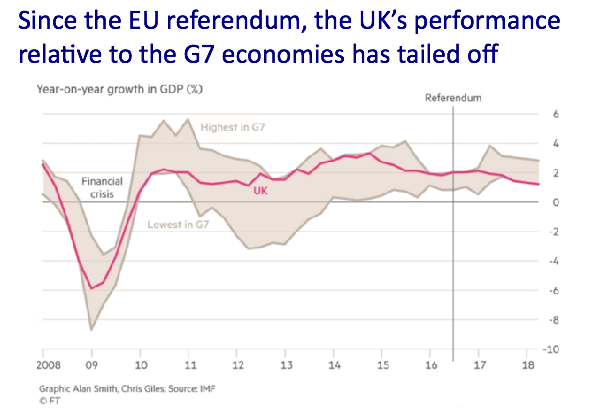
But now we need to hang a shadow of doubt over this whole business. In exhibit 1, we can see the major impact of the 2008 financial crisis and the rebound of the UK and the G7 – with the UK topping out the highest growth for several years. But unsurprisingly, this growth is lacking enthusiasm since the Brexit referendum. At the same time, the value of the pound nose-dived – we can see the effects in exhibit 2. So even with the international able to get a relative bargain from UK goods and services, the benefits to the economy are still unclear several years on.
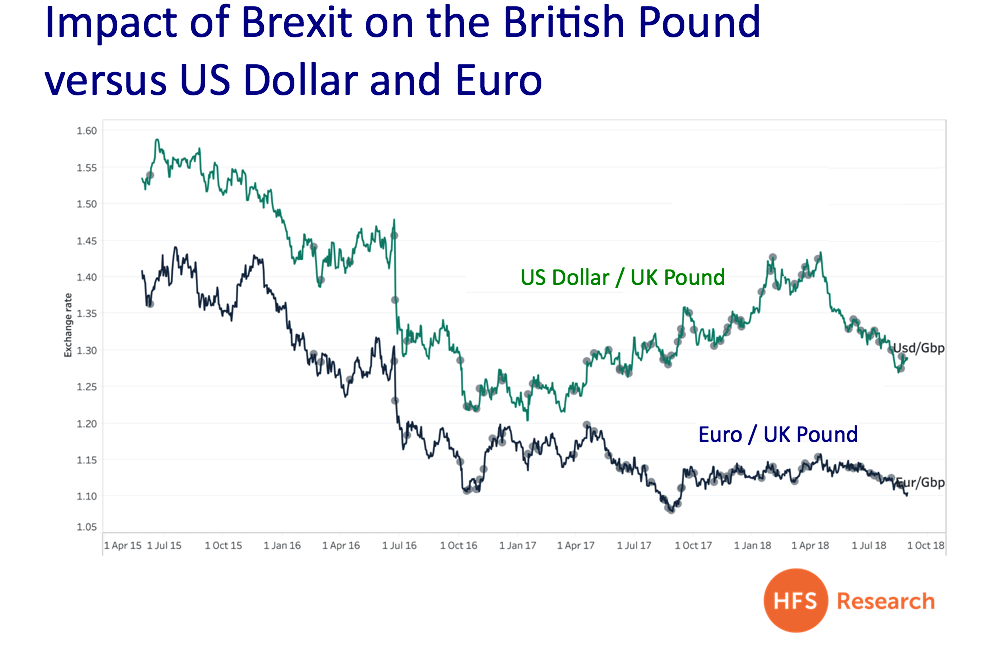
What does this mean for the services outsourcing industry? Well, the dip in the exchange rates could bite deep in some major outsourcing destinations. The drop in the value of the pound has, effectively increased the costs of outsourcing engagements in India, for example. So, enterprises may now be keener to insource or hold out on major outsourcing deals until the pound rallies – if it ever does.
It’s not clear what the net impact will be on nearshore engagements from within the EU. On the one hand, it will potentially be harder to contract and provide services across these new borders. But on the other, the skills shortages may make it a more attractive option. It will be interesting to see if the government in charge discourages this with taxation or regulation. Particularly given a large part of the reason behind Brexit was free movement and its impact on jobs/services.
Now this may seem like good news for the British economy, more domestic investment, right? But actually, the opposite may be the case. British businesses – avoiding buying in talent and tech will struggle to find the same scale domestically. And holding out on an outsourcing deal means just that, the engagement is paused – so no investment or productivity gains. Ultimately, this dynamic is less likely to make UK goods and services more competitive as exchange rates favour exports, but paradoxically could make enterprises less competitive.
The sensible multinationals will be hedging by stocking up on foreign currencies, and major exchange fluctuations can come ago relatively quickly. But several years of stayed business investment could be disastrous.
Uncertainty leaves business leaders, well, uncertain – and that could cripple business investment
Enterprises are already grappling with tough market conditions compounded by the moving feast that is digital transformation. British enterprises and their international partners, suppliers, and customers now have a whole fresh pile of uncertainty dolloped on them. National enterprises, while no doubt concerned, have to invest in their operations to some extent. But international businesses are holding back, and with good reasons; why invest in an area riven with uncertainty when there are much safer bets to divert resources to.
But even a recent Financial Times article charts the disparity between anecdotes from enterprise leaders advising they are holding back on investment and the data. While there have been some dips, overall investment intentions have remained relatively stable (see exhibit below). But this seems to be more down to enterprises splurging on spending after a period of adopting a ‘wait and see’ policy between the financial crisis and the referendum. The next big question is, when considering the points made earlier in this blog, is this trend likely to continue – particularly when a no-deal Brexit is now on the cards? The odds don’t look great.
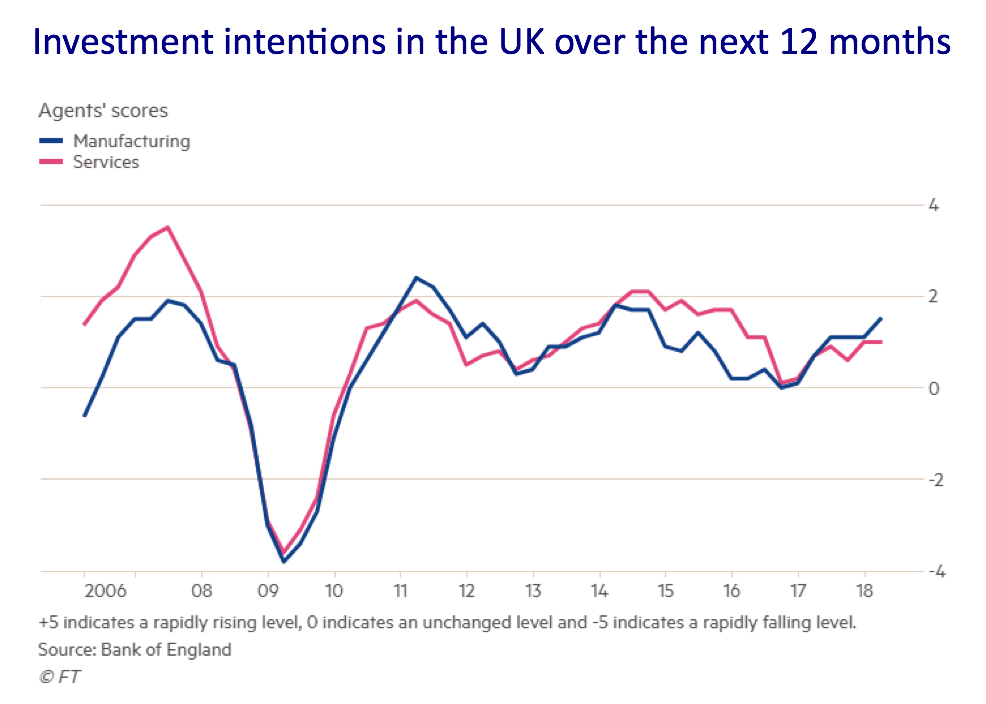
Contract lawyers and consultants could be the only winners as partnerships and contracts will need to be withdrawn
The dependencies of shifts in regulation, jurisdiction, and legislation are far from clear. But if there’s one thing we can be sure of, there will be a huge need to redraw the terms of existing contracts and agreements – the trouble is we don’t know and probably won’t know for some time. A no-deal Brexit could see enterprises and providers forced to go through the small print on almost every document they have. And while bureaucracy may sound like the least of our worries, the time and resource drain of activity of this scale will bite hard. Trust us. Whether that’s sucking resources from value-add projects or the cost of hiring experts who can actually understand what’s going on.
Multiple Choice Brexit Fallacy
The biggest fallacy put about by all sides of the debate in the UK about Brexit is there were lots of options for how the UK could leave the EU. Without anyone asking the other side of the negotiation the red lines. The hard Brexit side maintains that there is some beautiful nirvana that will suit their needs and be accepted by Europe – the “they need us more than we need them” argument. This is dangerous and is one of the things that probably confused the British people the most. The EU can (and always were going to) play hardball given what they have to lose. They were never going to allow even the appearance that the UK got all the benefits of the EU without paying and being subject to some of its rules. The equivalent of being a guest at a Gym expecting to pay less per diem and not getting kicked out for pissing in the pool.
The choice was always remain, deal, or no-deal. With the deal Brexit largely dictated by the other 27 EU countries,
It would be convenient to believe that control shifted to European negotiators over the past 6 months with May’s weaknesses revealed etc. but the truth is more that the European position has been fairly static, and the EU was always going to dictate the deal that is right for the rest of the EU.
With our prediction hat on we can only assume now that the EU will set out its position on the remaining elements of the deal. There may be a little wiggle room, but the deal position will be dictated by Europe and will most probably be like being in the EU but without any say. Which will annoy both sides of the debate.
So, we really have a no-win situation and little hope of a Kirk-like figure able to reprogram the scenario so that either side of the Brexit debate will be happy. Unless of course, remain voters will be happy with the likely removal of influence in the EU and some additional bureaucracy and Brexiteers with the superficial victory of being out of the EU in name only. But hey it will mean we won’t have MEPs, so Farage et al. will lose some of his platform and influence. Which is, at the very least, a minor victory for all of us who have lived through this sordid ordeal.
Bottom-Line: Unless we get our act together soon, anything that made Britain a competitive business location will be long gone
Ultimately, in a global economy, the only way a nation can thrive is by becoming a competitive destination for enterprises. Somewhere where they can find the regulatory environment and talent pool that will help their business thrive. All of this is what made Britain a great place to do business – a nation of talented business professionals conveniently situated between Europe and the U.S. In many ways, Brexit needn’t have been Britain’s undoing, but now as we stumble around in the dark with the rest of the world watching, we have little hope of reclaiming our legacy as the centre of global commerce.
The issue we now face is the no-win scenario – the “Brexit in name only” situation proposed by the government can only be weakened further by the negotiations in play. As we saw the other week the EU are prepared to play hardball. The other choice being no deal – which is as equally
But it’s not all bad news, here are some of the many (fictional) benefits we could see from Brexit
- Decline in national obesity: The government has been worried about an obesity health crisis for some time. So, it’s probably good news that Britain’s food security is at major risk due to what we can only imagine is an intentional mismanagement of logistics, supply, and haulage agreements with the EU. Which happens to be where we get most of the things we need to sustain our soon-to-be thinner selves.
- British cars will be nice and cheap: Well, cost is relative, and foreign cars will be extortionately pricey if all of these wonderful default tariffs set in. Maybe it’s time to bring back some of the good old-fashioned manufacturers. DeLorean anyone?
- Apothecaries will liven up the high street: With an expected staffing crisis and pharmaceuticals struggling to make their way into the UK, we might see a return of Apothecaries to the high street. I know what you’re thinking, modern medicine just doesn’t compare to stinging nettle soup and a course of leeches, but it’s probably all we’ll have.
We’ll have plenty of leisure time: With several major employers heading to the greener European mainland, the average leisure time of the British citizen could go through the roof. Unfortunately, we may be stuck sitting around a fire listening to elderly relatives tell us stories of the time when there was electricity.
We can all feel better about ourselves next time we are coaxed onto a dance floor at some boozy corporate gala dinner:

Posted in : policy-and-regulations


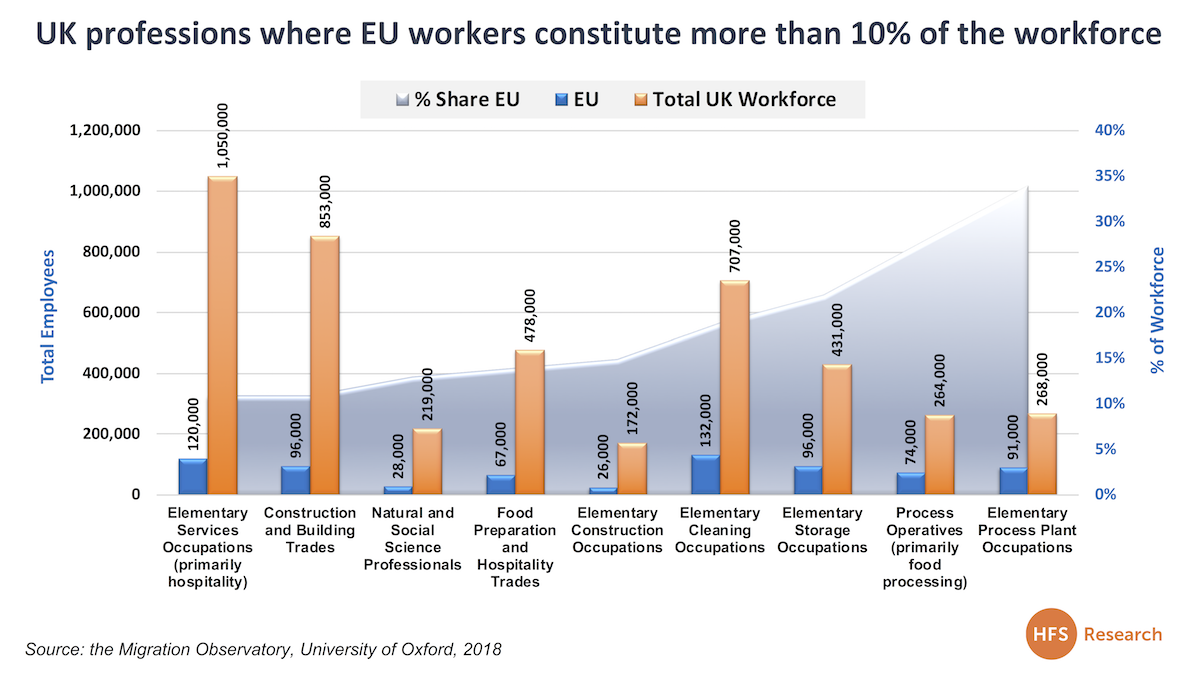





Absolutely a must read. Thank you HFS for the insight.
What an essay!!!! Take a bow 🙂
Excellent analysis and sums up the state of play extremely well. The British public made a mistake and it’s clear now many are realising it.
The analysis here is very sharp. The labour shortage is going to hurt the economy for many years to come.
Thank you for highlighting – I hope this article has some impact on the people making the bad decisions,
Paul
Does the analysis matches the facts in this article? If the pound is cheaper doesn’t that encourage investment? If salaries have to go up to attract skills is this a bad thing? It was always the case we can’t control a negotiation from one side, so we shouldn’t be suprised this will go to the wire and no agreement is a real possibility. Each impact and implication is complex and how it plays out is yet to be seen. It can also be argued either way. Investment and economic performance has been positive despite the obvious logic for major investors to wait and see. It makes sense to have an office in the EU to mitigate risks, but armageddon may remain deferred. The Euro and every Asian currency has dropped against the dollar in recent months etc., etc., there are so many factors at play. None of us really know the economic impacts of staying in a more tightly integrated Europe or going our separate ways, but for sure the UK has a habit of underplaying it’s strengths and overplaying risks. Imagine we focus on making it work the best we can and take a positive approach?
Motivational Milestones: Top 10 Quotes to Ignite Your Spirit : https://jivoice.com/motivational-milestones-top-10-quotes-to-ignite-your-spirit/